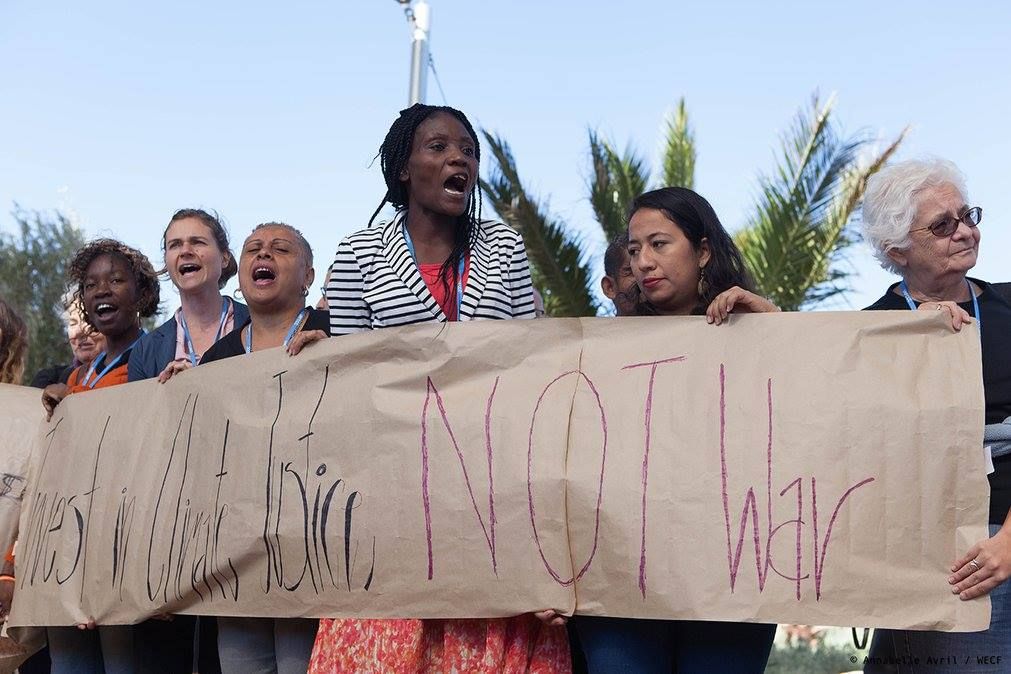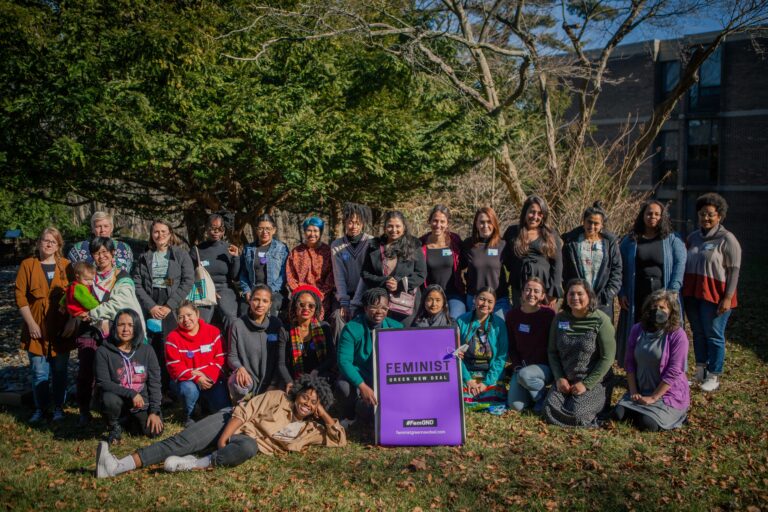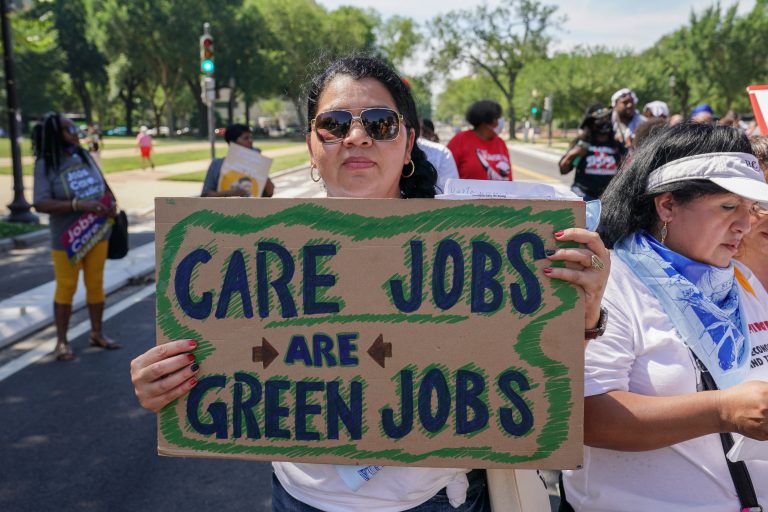April 2021
Messages for the Earth Day “Leaders Summit”
On April 22, 2021, forty world leaders will come together for the US-hosted Leaders’ Summit on Climate. The summit aims to be a critical moment for advancing ambition to meet the goals of the Paris Agreement, fulfilling countries commitment to pursue all efforts to limit warming to 1.5C and deliver on climate justice. It is also expected that the United States, and possibly other countries, will launch a new Nationally Determined Contribution (NDC). As the Feminist Green New Deal Coalition, we feel it is critical to center the views of frontline global South feminists on their expectations for this Summit, as well as to lift up intersectional feminist analysis of global justice.
Voices of Global South Feminists
“Due to inaction to deliver climate justice, women and girls are facing extreme implications, including low or no services for sexual and reproductive health in the aftermath of climate events. Similarly, there is no inclusion of women and girls in climate policy-making, which further shrinks spaces for women and girls in the public sphere. I urge leaders on this Earth Day to include more women and girls in climate policy making to establish a way forward for gender equality and increase solidarity with local feminists striving for climate justice,” said Nida Ali, Founder of Girls Got Voice (Pakistan)
“We expect global leaders to commit to real solutions for women, the people and the planet. Leaders of developed countries need to recognise they have an ecological and climate debt to the peoples in the global south, therefore, they need to pay their fair share and deliver on their financial commitments to ensure developing countries, especially SIDS and LDC’s, are able to mitigate and adapt to the effects of climate change, as well as to promote a just transition,” said Emilia Reyes, Program Director, Equidad de Género: Ciudadanía, Trabajo y Familia (Mexico). She added, “Financial support must come mostly to the public sector in the forms of grants or concessional finance rather than loans, unconditional and transparent, avoiding double counting; otherwise, the intersection of the environmental emergency, the debt crisis and the overall financial and health crises will impede the world to recover. Even more, to ensure debt sustainability and therefore the much needed fiscal space of developing countries to pursue the SDGs, climate goals, and human rights and gender equality commitments, developed countries should commit to permanent debt cancellation of external debt payments for up to four years to all developing countries in need without penalties; to protect developing countries from lawsuits when ceasing debt payments at national and multilateral levels; and agree to a multilateral sovereign debt workout mechanism under the auspices of the UN. Moreover, this is the time to commit to regulate once and for all the financial sector, so that it divests from harm and invest in care: private banks of developed countries have loaned US$2.7 trillion to fossil fuel companies since the Paris Agreement was adopted. Economic and environmental justice is gender justice!”
“Justice delayed is often justice denied and this will be the case for Indigenous and non-Indigenous women and girls, who need fast mitigation to avoid the catastrophic climate injustices. The delayed inaction jeopardizes the livelihoods of Indigenous peoples and feminist leaders. I encourage World leaders to adopt a gender-just climate policy. I also urge leaders to adopt nature-based solutions as it also promotes gender equality because women and especially indigenous women are the holders of this knowledge,” said Cindy Kobei, Chairperson of Ogiek Youth Council (Kenya)
“To combat the climate crisis that we are currently experiencing, many countries have been concerned about taking actions that protect only 30% of the planet, but if we make an analysis, this proposal ends up being a distraction strategy; it is not dealing with what really needs to be changed, modified or reconsidered, such as the economic models developed by governments bringing misery and negative environmental impacts to communities. On the other hand, if we continue with this model of economic growth, we will continue to be tied to consumerism, capitalism, anthropocentrism, exploitation, sexism and division within the same communities, constituting a system of power that benefits those who have greater economic and purchasing power over the rights of the community,” shared Luzbeidy Monterrosa Atencio, young indigenous woman of the Wayuu people (Colombia). “Therefore, what they should commit themselves to: is to recognize that Indigenous peoples exist and that we are the ones who have been responsible for protecting and safeguarding the biodiversity of our territories. Likewise, we have to talk about the need to have food sovereignty and to urgently carry out comprehensive and wide-ranging agrarian reforms to encourage agriculture. It is also necessary to implement decentralized renewable energy sources with low environmental impact within the reach of the people. We need to start from sensitivity, spirituality, respect for the whole and its beings, completely rejecting the continued damage to Woumainkat – Mother Earth.”
“Para combatir la crisis climática que se está viviendo actualmente, muchos países se han preocupado por tomar acciones que protegen solo el 30% del planeta, pero si hacemos un análisis, esta propuesta termina siendo una estrategia de distracción; es no hacerle frente a lo que realmente es necesario cambiar, modificar o replantear, como los modelos económicos desarrollados por los gobiernos trayendo miserias e impactos ambientales negativos para las comunidades. Por otra parte, si seguimos con este modelo de crecimiento económico seguiremos ligados al consumismo, capitalismo, antropocentrismo, explotación, sexismo y la división dentro de las mismas comunidades, constituyendo un sistema de poder que beneficia al que tiene mayor poder económico y adquisitivo sobre los derechos de la colectividad.” Luzbeidy Monterrosa Atencio, joven indígena del pueblo Wayuu (Colombia). “Por lo tanto, en lo que deberían comprometerse es a reconocer que los pueblos indígenas existimos y, además somos quienes nos hemos encargado de proteger y salvaguardar la biodiversidad de nuestros territorios milenarios. Asimismo, tenemos que hablar que es necesario tener soberanía alimentaria, hacer de forma urgente las reformas agrarias integrales y de gran amplitud, incentivar a la agricultura. También, se necesita implementar fuentes de energía renovables descentralizadas y de bajo impacto ambiental dentro del alcance de los pueblos. Necesitamos partir desde la sensibilidad, espiritualidad, el respeto hacia el todo y sus seres, rechazar por completo que se siga haciendo daño a Woumainkat |Madre tierra|”
“Women in Africa are not only affected by climate change impacts like disasters – floods which destroys their homes and settlements, droughts that affect their agricultural produce and livelihoods – but also by the very climate policies supposed to protect them because of patriarchal norms and masculinity systems. We urge the U.S. and other Governments to take the lead in transforming the system with gender sensitive & responsive climate actions and policies,” said Ndivile Mokoena, Project Officer at GenderCC-Southern Africa (South Africa)
Director of Network for Social Justice and Human Rights (Brazil), Maria Luisa Mendonça shared, “The Biden administration and other countries should not trust Bolsonaro to negotiate climate agreements in Brazil. Indigenous and environmental organizations demand a boycott of agricultural commodities from Brazil, such as soy, sugar, beef and timber, which are a main cause of environmental destruction. The international community needs to oppose the Bolsonaro administration for its active incentive to deforestation and repression against rural communities that are struggling to protect rich biodiverse regions in the Amazon, the Cerrado and Pantanal. We need to oppose agribusiness and build ecological food systems to deal with the current climate and health crises.”
Feminist Analysis of Real Action for Climate Justice
Below are talking points for use by FemGND coalition members and movement partners, building from the Feminist GND Coalition Principles; we welcome all to use them as you can.
We cannot afford to invest in false and harmful “solutions” to the climate crisis.
- The Biden administration’s commitment to net zero emissions by 2050 is not the urgent, ambitious action we need to confront the scale and speed of the climate crisis. “Net zero” action by 2050 is too little, too late.
- “Net zero” framing leaves far too much space for false and harmful climate solutions — like carbon trading and offset programs which place human rights at risk by enabling land grabs, including on Indigenous territories, while allowing companies to continue polluting — and expensive, often untested, technologies for carbon capture and geoengineering. “Net zero” allows countries and corporations to greenwash their harms, and avoid real action to reduce emissions now.
Keep fossil fuels in the ground.
- Rather than false and harmful solutions, we must focus on tackling the root causes of the climate crisis: extractivism and the fossil fuel industry. Climate justice requires a 100% transition to renewable energy that is justly sourced and that divests from the mining, fossil fuel, and agribusiness-based economy that fuels climate change. Governments must stop approving fossil fuel infrastructure furthering climate breakdown, and we must end fossil fuel and agribusiness subsidies that allow these industries to profit off of climate devastation domestically and globally.
The US must contribute its fair share to address systemic global inequalities and promote gender equality.
- The US has historically been the world’s largest emitter of carbon, and indeed, the US military alone is a bigger polluter than approximately 140 countries. Meanwhile, countries in the Global South least responsible for the crisis are experiencing the brunt of its effects — from severe droughts to devastating typhoons to economic repercussions.
- As a result of the intertwined systems of colonialism, settler colonialism, imperialism, neoliberalism, and decades of racism and patriarchy, frontline communities — particularly Black and Indigenous women, girls and gender non-conforming people — in the US and Global South face the most severe impacts of the climate crisis, environmental degradation, and toxic pollution.
- The U.S. is the world’s largest historical emitter and the wealthiest nation, yet has failed on climate finance commitments. It must address its climate debt to the Global South through ambitious and urgent emissions reductions; unprecedented commitments to climate finance; and reparations for impacted communities, including women and girls in all their diversity.
- The Biden administration must commit to significantly increasing support for countries at the frontlines of the climate crisis to ensure their governments can resource their own just transitions and protect vulnerable communities from the effects of climate change. This can include global debt relief and economic justice measures, such as US support for up to $3 billion in Special Drawing Rights (SDRs).
To address the climate crisis, we must confront militarism.
- The US military is the world’s largest institutional emitter of greenhouse gases. It destabilizes communities and launches wars to seize and defend oil and gas reserves around the world. But “greening the military” by cutting its carbon emissions is a false solution that allows devastating military operations worldwide to go unchecked.
- In the US, the climate crisis is increasingly being framed as a key “national security” threat. Indeed, the Leaders’ summit agenda plans to “address the global security challenges posed by climate change and the impact on readiness.” Yet, the danger of such framing is that it will give rise to militarized solutions to the effects of the climate crisis, such as increases in climate migration or potential conflict over scarce resources, and an increased Pentagon budget for “military readiness” and to make the military more sustainable.
- Rather than making the military more ‘green,’ we need to fundamentally challenge US militarism, with its more than 800 carbon-emitting military bases in over 70 countries around the world, and dedicate resources to clean up polluted sites and support impacted communities.
Intersectionality is key.
- Just climate solutions demand intersectional approaches. In our deeply unequal society, gender interacts with sexuality, race, national origin, age, class, disability, and other identities to shape people’s access to power and resources, leaving some disproportionately impacted by and vulnerable to climate disruption. An intersectional gender lens must be integrated at every stage of development, implementation and monitoring of climate policies, plans and solutions.
- Global climate finance must bring a gender lens, including to recognize how women, girls and LGBTQ+ people are differently impacted by the climate crisis and climate disasters — and to fund and resource grassroots women-led adaptation, mitigation and climate resilience solutions.
- As we accelerate a just transition to a renewable economy, we must tackle structural racism and patriarchy, and prioritize investments for Black, brown, and Indigenous women, girls and gender non-conforming people — who have been disproportionately exposed to toxic air and water pollution and the risks associated with climate change.
Respect Indigenous rights and sovereignty.
- Indigenous Peoples hold rights over and protect 25% of the earth’s land surface and 80% of remaining biodiversity. Any solutions to the climate crisis must center Indigenous sovereignty, rights, and solutions. This includes binding legal recognition of Indigenous land rights, enforcement of the right to Free, Prior and Informed Consent as codified in ILO 169 and UNDRIP both within and outside the US, and recognition of the Rights of Nature.
- Indigenous organizers, including women and youth, are mobilizing to shut down pipelines that threaten their lands, livelihoods, health and sovereignty. The Biden administration must respect Indigenous rights and commit to ending pipeline construction, including Line 3 and DAPL.
Care is central to climate action.
- The summit focuses on the “economic benefits of climate action, with a strong emphasis on job creation.” Federal and global investments toward a just transition to a green economy and green infrastructure must center and resource care.
- “Climate work” must encompass both the work that is necessary to transition to a low-carbon economy as well as the work that is necessary to care for each other while and after we do so. The climate crisis will amplify the need for care, in response to increasing health impacts and disaster response needs, and this work is critical to dealing with ongoing and future climate impacts.
- If “climate work” and “green jobs” means work that is low-carbon and that aids us in the transition to a low-carbon economy, care work is and has been climate work.
Place grassroots and feminist movements at the center of policymaking.
- We need to democratize our policymaking and institutional spaces and create more participatory processes that center the voices and expertise of social movements — including grassroots and feminist movements in the US and Global South; youth; Black, Indigenous and communities of color; and LGBTQIA+ organizers.


